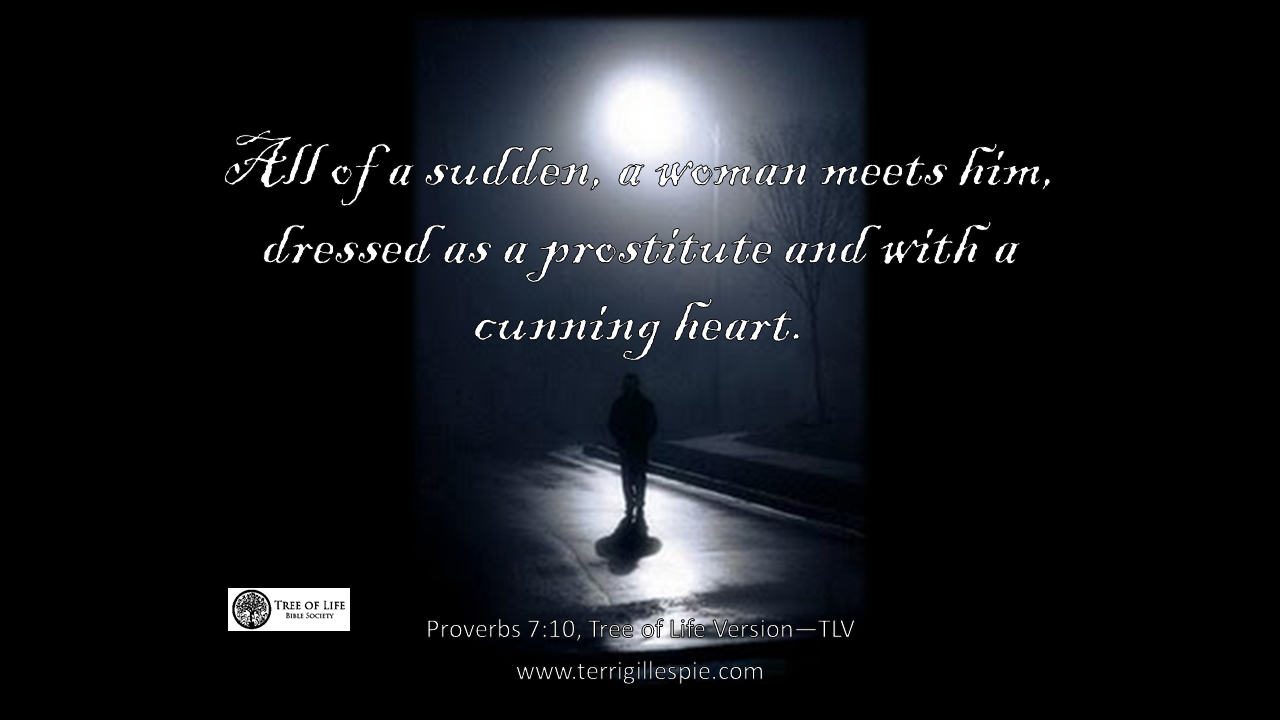Do you trust me? We’re unpacking something rich.
TODAY’S PROVERBS: All of a sudden, a woman meets him, dressed as a prostitute and with a cunning heart. Proverbs 7:10
 Do you trust me?
Do you trust me?
This proverb jumped out at me this morning. It needs serious unpacking. Hubby and I talked at length about it. Honestly, it may not quite be ready for “prime time,” but I think our Heavenly Father has given me the go-ahead. If I’m wrong, and it’s a bit premature, please forgive me.
Anytime I “unpack” a passage that contains what I believe to be a theme, I begin with finding the themes in other parts of the Bible. I grew up with my pastors drilling into us that “Scripture must interpret Scripture” — otherwise it’s too easy to take a verse out of context.
When I read this verse, my first thought was, “Why would a wife — possibly a mother — want to appear as a prostitute?” (vs. 19-20)
Verse 11 says that “She is loud and defiant. Her feet never stay at home—” That seems to indicate she has a lust for sex — with other men — that defies her sacred vows of matrimony and monogamy. Does that remind you of someone else? (Hosea’s wife Gomer, Hosea 1)
Since this wayward woman tries to pass herself off as a prostitute, there appears to be an understanding that prostitution is “less of a sin” than adultery. This seems to prove out in Proverbs with passages that caution against spending everything to be with a prostitute (Proverbs 6:26; 20:16; 23:27; 27:13; 29:3; 1 Corinthians 6:16), rather than saying, you’re sinning against the Almighty God, period.
Likewise, the greater severity of adultery’s repercussions is shown as well (Leviticus 20:10; Proverbs 6:26, 32). The severity is death for all parties.
Here’s what I “heard” as I reflected on King Solomon’s seemingly weighing of these sexual sins: Victimless Crimes.
The definition of a victimless crime is a legal offense to which all parties consent and no party is injured. Which means in many of America’s cities prostitution is against the law, but, oh well. The law is not enforced, because no one is “hurt.”
Adultery, on the other hand is no longer against the civil law, even though the repercussions are more harmful than fornication.
We’ve heard that before, haven’t we? As long as we’re consenting adults, no big deal, right? I don’t think so.
That’s like saying there are victimless sins.
Here’s what applies to all of us: There’s no such thing as a victimless sin. So let’s drill down to the lowest common denominator for all of us.
As someone who has been called to live more of a Jewish lifestyle, there have been critics — or well-meaning souls — who caution my husband and me to not “place ourselves under the law.” We’re now living under the New Covenant. Because of Jesus’ blood atonement for our sins, we aren’t under the law.
What does “under the law” mean? That we don’t obey God’s commandments? We’re no longer subject to abstaining from sex outside marriage, we can take God’s Name in vain, murder, covet, or lie? Of course not. Not being under the law means we’re not under the penalty of the law (Romans 3:20-31), which is separation from our Father and eternal damnation. Not being under the repercussions of violating the Law is a good thing.
When our Father gave Jeremiah the prophecy about the New Covenant (Jeremiah 31:30-36), He said the Torah — the Law — would be written in our hearts. When He said that, He was saying that we were going to be more accountable to the spirit of the law, not just the letter of the law.
Jesus followed through with His Father’s words on this in one of the most profoundly clear confirmations of Jeremiah 31 — Matthew 5. From the Beatitudes (vss 3-12), to His “Do not thinks” (vss. 17-48), Jesus expected a greater responsibility to the law, in our heart.
So, if we go back and apply this New Covenant ethos to Miss Sassypants in today’s proverb, the moment the temptation became a choice in her heart to leave her husband’s bed and find another man, she had sinned. The moment Young and Stupid decided to leave his home looking for adventure and lusted after Sassypants, he committed the sin of adultery. Long before either of them physically committed the act with their bodies, according to Yeshua, they were already guilty of sin.
Here’s our Take-Away, my friends. There is no such thing as a victimless sin. Sin begins

Where is God taking ME with this?
with the eyes and ears, travels to the mind, then the heart, and if not stopped, the body. Our soul falls victim to sin the moment our heart thinks it’s okay to allow the temptation control — even if we don’t act upon it. Acting upon it creates even more problems because the repercussions have a wider scope.
If we merely think about stealing the paperclip, the car, the money, or lying to our parents, spouse, children, or going to that pornography site, buying that magazine, or laying with someone not our spouse, we need to repent. We need to know that Jesus carried those sins to cross as well. He had to experience that dirt, those thoughts.
Whether we think or act the sin, we have victimized our own soul.
When we repent, we are forgiven. When we turn away, we are set free. And that, my dear friends, is a good thing.
If you’ve read this through, I’m sending e-hugs and gratitude. I would love to hear your thoughts. And, I want to encourage you to watch out for those “blink”* passages that may have hidden themes that will help you dig deeper into what it means to walk this wisdom journey.
May the Holy Spirit show us what our Father’s truth and wisdom is for all of us, my friends.
Proverbs 7:10, Tree of Life Bible Society, Tree of Life Version – TLV, #tlvbible, #tlvproverbs
[WATCH Tree of Life Bible Society’s CEO, Daniah Greenberg and me, Terri Gillespie, Author dig a little deeper with this proverb. Check us out at Tree of Life Bible Society, Monday through Friday, LIVE at 8:30am EST. Watch previous episodes there as well. Stay wise, my friends!]*A “blink” proverb is a proverb that on the surface, we don’t believe applies to us. However, on closer reflection, there are relevant insights and wisdom for us. Thanks to Dr. Raleigh Washington for the great analogy.



